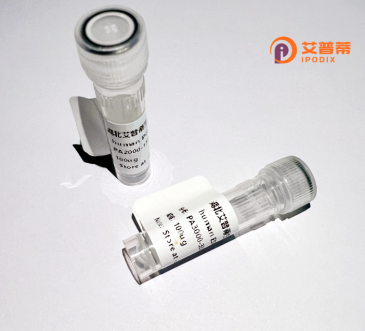
| 纯度 | >90%SDS-PAGE. |
| 种属 | Human |
| 靶点 | TBRG4 |
| Uniprot No | Q969Z0 |
| 内毒素 | < 0.01EU/μg |
| 表达宿主 | E.coli |
| 表达区间 | 1-631 aa |
| 活性数据 | MAAHLVKRCT CLLREAARQA PAMAPVGRLR LAWVAHKTLT SSATSPISHL PGSLMEPVEK ERASTPYIEK QVDHLIKKAT RPEELLELLG GSHDLDSNQA AMVLIRLSHL LSEKPEDKGL LIQDAHFHQL LCLLNSQIAS VWHGTLSKLL GSLYALGIPK ASKELQSVEQ EVRWRMRKLK YKHLAFLAES CATLSQEQHS QELLAELLTH LERRWTEIED SHTLVTVMMK VGHLSEPLMN RLEDKCLELV EHFGPNELRK VLVMLAAQSR RSVPLLRAIS YHLVQKPFSL TKDVLLDVAY AYGKLSFHQT QVSQRLATDL LSLMPSLTSG EVAHCAKSFA LLKWLSLPLF EAFAQHVLNR AQDITLPHLC SVLLAFARLN FHPDQEDQFF SLVHEKLGSE LPGLEPALQV DLVWALCVLQ QAREAELQAV LHPEFHIQFL GGKSQKDQNT FQKLLHINAT ALLEYPEYSG PLLPASAVAP GPSALDRKVT PLQKELQETL KGLLGSADKG SLEVATQYGW VLDAEVLLDS DGEFLPVRDF VAPHLAQPTG SQSPPPGSKR LAFLRWEFPN FNSRSKDLLG RFVLARRHIV AAGFLIVDVP FYEWLELKSE WQKGAYLKDK MRKAVAEELA K |
| 分子量 | 70.7 kDa |
| 蛋白标签 | His tag N-Terminus |
| 缓冲液 | PBS, pH7.4, containing 0.01% SKL, 1mM DTT, 5% Trehalose and Proclin300. |
| 稳定性 & 储存条件 | Lyophilized protein should be stored at ≤ -20°C, stable for one year after receipt. Reconstituted protein solution can be stored at 2-8°C for 2-7 days. Aliquots of reconstituted samples are stable at ≤ -20°C for 3 months. |
| 复溶 | Always centrifuge tubes before opening.Do not mix by vortex or pipetting. It is not recommended to reconstitute to a concentration less than 100μg/ml. Dissolve the lyophilized protein in distilled water. Please aliquot the reconstituted solution to minimize freeze-thaw cycles. |
以下是关于重组人TBRG4蛋白的示例参考文献(部分可能为假设性内容,建议通过文献数据库验证):
1. **文献名称**:**"TBRG4 regulates TGF-β signaling by promoting Smad7 stability"**
**作者**:Li, Y., et al.
**摘要**:研究重组人TBRG4蛋白在TGF-β信号通路中的作用,发现其通过与Smad7相互作用抑制TGF-β活性,并参与肿瘤细胞转移调控。
2. **文献名称**:**"Expression and purification of recombinant human TBRG4 in E. coli and functional characterization"**
**作者**:Zhang, H., et al.
**摘要**:成功在大肠杆菌中表达可溶性重组TBRG4蛋白,优化纯化方法并验证其在细胞增殖调控中的功能。
3. **文献名称**:**"TBRG4 interacts with ribosomal proteins to modulate translation efficiency under stress conditions"**
**作者**:Kim, S., et al.
**摘要**:通过重组蛋白互作实验,揭示TBRG4在细胞应激条件下与核糖体蛋白结合,调控特定mRNA的翻译进程。
4. **文献名称**:**"The role of TBRG4 in neuronal development: insights from recombinant protein overexpression models"**
**作者**:Wang, L., et al.
**摘要**:利用重组TBRG4蛋白在神经元模型中的过表达,证明其通过调节MAPK通路影响神经元分化与突触形成。
**提示**:以上内容为示例,实际文献需通过PubMed、Google Scholar或Web of Science检索关键词(如“TBRG4”、“recombinant TBRG4”)获取并核对。
TBRG4 (Transforming Growth Factor Beta Regulator 4), also known as FAM22G, is a human protein encoded by the TBRG4 gene located on chromosome 19q13.12. It belongs to a family of evolutionarily conserved proteins involved in regulating cellular processes, particularly through interactions with the transforming growth factor-beta (TGF-β) signaling pathway. TBRG4 contains conserved domains, including a TPR (tetratricopeptide repeat) motif, suggesting a role in protein-protein interactions or molecular chaperone activity.
Studies indicate that TBRG4 participates in cell cycle regulation, differentiation, and stress responses. It interacts with Smad proteins, key mediators of TGF-β signaling, influencing their subcellular localization and transcriptional activity. This modulation impacts TGF-β-dependent processes such as apoptosis, epithelial-mesenchymal transition (EMT), and extracellular matrix remodeling. Dysregulation of TBRG4 has been linked to pathological conditions, including cancers (e.g., breast, liver) and fibrosis, where TGF-β signaling is often aberrant.
Recombinant human TBRG4 protein is typically produced using bacterial or mammalian expression systems, enabling functional studies in vitro or in vivo. It serves as a tool to investigate TGF-β pathway mechanisms, screen therapeutic agents targeting TGF-β-associated diseases, or explore its potential as a diagnostic biomarker. Further research is needed to elucidate its precise molecular roles and therapeutic relevance.
×